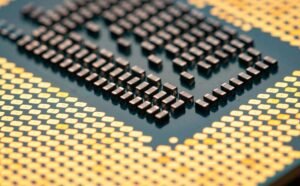Quantum Computing Algorithms Review
Quantum computing is a revolutionary technology that promises to solve complex problems exponentially faster than classical computers. At its core, quantum computing leverages quantum bits or qubits, which can exist in multiple states simultaneously. While still in its early stages of development, quantum algorithms are paving the way for groundbreaking applications in fields like cryptography, optimization, and drug discovery.
Key Takeaways:
- Quantum computing utilizes qubits to process information in multiple states simultaneously.
- Quantum algorithms have the potential to revolutionize various industries.
- Some notable quantum algorithms include Shor’s algorithm and Grover’s algorithm.
- Quantum computing is an emerging technology with exciting possibilities for the future.
One of the most renowned quantum algorithms is Shor’s algorithm, which aims to factor large numbers exponentially faster than classical algorithms. It exploits a phenomenon called quantum parallelism to test multiple possibilities simultaneously, drastically reducing the time required for factorization. *Shor’s algorithm has the potential to break the widely used RSA encryption, making it a significant concern for cybersecurity.* While Shor’s algorithm remains a theoretical construct for now, its development could have profound implications for data privacy and online security.
Grover’s algorithm, on the other hand, is a quantum search algorithm known for its ability to search unsorted databases faster than classical algorithms. By utilizing properties of quantum superposition and interference, Grover’s algorithm can amplify the relevant information within the database and extract the desired result efficiently. *This algorithm has the potential to revolutionize data retrieval and optimization tasks.* While it may not have as wide-ranging implications as Shor’s algorithm, Grover’s algorithm still offers significant advantages over classical search algorithms.
Quantum Algorithms Overview
| Algorithm | Application | Advantages |
|---|---|---|
| Shor’s Algorithm | Factorization, Cryptography |
|
| Grover’s Algorithm | Search, Optimization |
|
Aside from Shor’s and Grover’s algorithms, there are several other quantum algorithms that show promise. For instance, quantum approximate optimization algorithm (QAOA) offers a heuristic approach to solving optimization problems. By exploiting quantum entanglement and superposition, QAOA provides near-optimal solutions to various real-world optimization problems. *QAOA holds immense potential for applications in supply chain management and logistics, offering significant efficiency improvements.*
Quantum Algorithms in Action
| Algorithm | Application |
|---|---|
| Shor’s Algorithm | Cryptography |
| Grover’s Algorithm | Database Search |
| QAOA | Optimization |
As quantum computing continues to advance, more powerful algorithms are being developed to tackle significant problems as they arise. For example, the Quantum Approximate Optimization Algorithm (QAOA) has shown promising results in solving optimization problems. *Combining classical and quantum computing techniques, QAOA demonstrates the potential for increased efficiency in various real-world applications.*
While quantum algorithms hold immense potential for revolutionizing various industries, it’s important to note that the field is still in its early stages. The development of practical and scalable quantum computers, capable of running these algorithms at scale, is a significant challenge. Additionally, the design and implementation of these algorithms require expertise and computational resources that are currently limited. Nonetheless, as research continues to explore the possibilities of quantum computing, the horizon looks promising.

Common Misconceptions
Misconception 1: Quantum computing algorithms are exponentially faster than classical computing algorithms
One common misconception about quantum computing algorithms is that they are exponentially faster than classical computing algorithms. While it is true that certain quantum algorithms, such as Shor’s algorithm for factoring large integers, can provide exponential speedup over their classical counterparts, this is not the case for all quantum algorithms. In fact, many quantum algorithms only offer polynomial speedup or have similar runtime complexities as classical algorithms.
- Quantum algorithms offer exponential speedup only in specific cases
- Some quantum algorithms have similar runtime complexities as classical algorithms
- Not all problems can be solved more efficiently using quantum algorithms
Misconception 2: Quantum computing algorithms can solve any problem efficiently
Another misconception is that quantum computing algorithms can efficiently solve any problem. While quantum computers have the potential to solve certain problems more efficiently than classical computers, there are still limitations. Some problems are inherently difficult and no algorithm, whether classical or quantum, can provide an efficient solution. It’s important to understand that quantum computing is not a magic solution that can solve all computational problems.
- Quantum computing has limitations in solving certain computationally difficult problems
- Some problems cannot be solved efficiently even with quantum algorithms
- Quantum computing is not a universal solution for all computational problems
Misconception 3: Quantum computing algorithms can provide instant solutions
A misconception surrounding quantum computing algorithms is that they can provide instant solutions to complex problems. However, this is not the case. Quantum computing algorithms, like their classical counterparts, require time to execute and compute the desired result. While quantum algorithms can provide efficient solutions for specific problems, they still require a finite amount of time to run.
- Quantum computing algorithms require time to execute and compute solutions
- Quantum algorithms are not instantaneous
- Running a quantum algorithm still takes a finite amount of time
Misconception 4: Quantum computing algorithms are error-free
Many people mistakenly believe that quantum computing algorithms are error-free. In reality, quantum computers are highly susceptible to errors due to various factors, such as environmental disturbances and imperfections in hardware. Quantum algorithms often utilize error correction techniques to mitigate the impact of errors. However, error-free quantum computing is still an active area of research and is yet to be fully realized.
- Quantum computers are susceptible to errors
- Error correction techniques are used to mitigate errors in quantum algorithms
- Error-free quantum computing is still an active area of research
Misconception 5: Quantum computing algorithms will replace classical computing
One common misconception is that quantum computing algorithms will replace classical computing in the near future. While quantum computing holds promise in certain areas, it is unlikely to completely replace classical computing. Quantum computers excel at solving specific types of problems, but they are currently limited in terms of scalability and practicality for general-purpose computing. Classical computing will continue to play a crucial role alongside quantum computing in the foreseeable future.
- Quantum computing is not expected to completely replace classical computing
- Classical computing still has advantages and practicality in many areas
- Quantum computing and classical computing will coexist and complement each other

Quantum Computing Algorithms Review
Quantum computing is an emerging field that holds immense potential to revolutionize various industries. In this review, we will examine ten key algorithms used in quantum computing and explore their applications and impact. These algorithms provide exciting opportunities for solving complex problems more efficiently and further advancing computing capabilities.
1. Grover’s Algorithm
Grover’s algorithm is a quantum search algorithm, which can efficiently locate an item in an unsorted database. It offers a quadratic speed-up over classical algorithms and finds applications in optimization, cryptography, and data mining.
| Algorithm | Speed-up Factor | Applications |
|---|---|---|
| Grover’s Algorithm | O(sqrt(N)) | Optimization, Cryptography, Data Mining |
2. Shor’s Algorithm
Shor’s algorithm is a prime factorization algorithm that can efficiently factor large numbers. It has significant implications for cryptography, as it can break the widely used RSA encryption scheme.
| Algorithm | Speed-up Factor | Applications |
|---|---|---|
| Shor’s Algorithm | O(N^3) | Cryptanalysis, Number Factoring |
3. Deutsch-Jozsa Algorithm
The Deutsch-Jozsa algorithm is used to determine if a function is constant or balanced with only a single evaluation. It showcases the ability of quantum computers to outperform classical computers in specific cases.
| Algorithm | Speed-up Factor | Applications |
|---|---|---|
| Deutsch-Jozsa Algorithm | O(1) | Function Evaluation, Boolean Function Analysis |
4. Quantum Fourier Transform
The Quantum Fourier Transform (QFT) is a fundamental algorithm in quantum computing. It can efficiently compute the discrete Fourier transform, thus enabling faster signal processing, data compression, and error correction.
| Algorithm | Speed-up Factor | Applications |
|---|---|---|
| Quantum Fourier Transform | O(log(N)^2) | Signal Processing, Data Compression, Error Correction |
5. Quantum Phase Estimation
Quantum Phase Estimation (QPE) is an algorithm used to estimate the phase of a given quantum state. It has applications in solving discrete logarithm problems, improving the efficiency of quantum simulations, and creating more accurate algorithms for chemistry simulations.
| Algorithm | Speed-up Factor | Applications |
|---|---|---|
| Quantum Phase Estimation | O(log(N)) | Discrete Logarithm Problems, Quantum Simulations, Chemistry Simulations |
6. Quantum Walk
The Quantum Walk algorithm simulates a random walk on a quantum computer. It finds applications in graph theory, optimization, and searching unstructured databases.
| Algorithm | Speed-up Factor | Applications |
|---|---|---|
| Quantum Walk | O(sqrt(N)) | Graph Theory, Optimization, Database Searching |
7. Variational Quantum Eigensolver
The Variational Quantum Eigensolver (VQE) algorithm is used to estimate the lowest eigenvalue of a given Hamiltonian. It is employed in quantum chemistry for determining molecular properties and simulating molecular systems.
| Algorithm | Speed-up Factor | Applications |
|---|---|---|
| Variational Quantum Eigensolver | O(log(N)) | Quantum Chemistry, Molecular Property Estimation |
8. Quantum Approximate Optimization Algorithm
The Quantum Approximate Optimization Algorithm (QAOA) is used for finding approximate solutions to optimization problems. It has implications in various domains such as logistics, finance, and operations research.
| Algorithm | Speed-up Factor | Applications |
|---|---|---|
| Quantum Approximate Optimization Algorithm | O(log(N)) | Logistics, Finance, Operations Research |
9. Quantum Teleportation
Quantum Teleportation allows the transfer of quantum information from one location to another by utilizing entangled quantum states. It forms the basis for secure quantum communication protocols and quantum networking.
| Algorithm | Speed-up Factor | Applications |
|---|---|---|
| Quantum Teleportation | O(1) | Quantum Communication, Quantum Networking |
10. Quantum Error Correction
Quantum Error Correction (QEC) aims to protect quantum systems from decoherence and errors that occur during computation. It is a critical component for realizing fault-tolerant quantum computers and reliable quantum information processing.
| Algorithm | Speed-up Factor | Applications |
|---|---|---|
| Quantum Error Correction | O(1) | Fault-Tolerant Computing, Quantum Information Processing |
Conclusion
Quantum computing algorithms open up new avenues for solving complex problems and optimizing various domains. The algorithms discussed in this review, such as Grover’s algorithm, Shor’s algorithm, and Quantum Fourier Transform, demonstrate the potential of quantum computing to revolutionize optimization, cryptography, and signal processing. Additionally, algorithms like Quantum Teleportation and Quantum Error Correction pave the way for secure quantum communication and reliable quantum computation. As the field advances, these algorithms will continue to evolve, contributing to the development of advanced quantum technologies.
Quantum Computing Algorithms Review – Frequently Asked Questions
What is quantum computing?
What are quantum computing algorithms?
How do quantum algorithms differ from classical algorithms?
What are some well-known quantum computing algorithms?
Are quantum computing algorithms applicable to all problems?
What is a quantum computing algorithm review?
Why is a review of quantum computing algorithms important?
How are quantum computing algorithms reviewed?
Where can one find reviews of quantum computing algorithms?
What is the future outlook for quantum computing algorithms?




